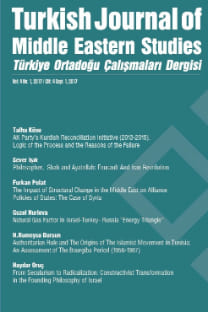Parlamenter Sistemde Başkanlık Dış Politikasını Şekillendirmek: Erdoğan ve Muhtarlar Toplantıları
Recep Tayyip Erdoğan, muhtarlar toplantıları, Türk dış politikası, başkanlık sistemi, Avrasyacılık
Framing a Presidential Foreign Policy in a Parliamentary System: Erdoğan and Mukhtars’ Meetings
Recep Tayyip Erdoğan, mukhtars’ meetings, Turkish foreign policy, presidential system, Eurasianism,
___
- (for the texts of Erdoğan’s mukhtars meetings speeches)Türkiye Cumhuriyeti Cumhurbaşkanlığı. https://www.tccb.gov.tr/receptayyiperdogan/konusmalar/.
- Ahren, Raphael. 2017. “Ex-Defense Chief: Erdogan is ‘Deliberately Islamicizing’ Europe in Bid for World Domination.” The Times of Israel. June 6. http://www.timesofisrael.com/an-ex-defense-chief-sees-europe-deliberately-islamicized-at-turkeys-hand/.
- Akgün, Mensur. 2010. “Turkey: What Axis Shift?” Le Monde Diplomatique. July 9. http://kit.mondediplo.com/spip.php?article5676.
- Akyol, Mustafa. 2015. “Unraveling the AKP’s ‘Mastermind’ Conspiracy Theory.” Al-Monitor. March 19. http://www.al-monitor.com/pulse/originals/2015/03/turkey-zion-protocols-akp-version.html.
- __________. 2016. “How Islamic Will Erdogan’s Presidential System Be?” Al-Monitor. December 9. http://www.al-monitor.com/pulse/originals/2016/12/turkey-islamic-erdogans-presidential-system-will-be.html.
- Aras, Bülent. “The Davutoğlu Era in Turkish Foreign Policy.” Insight Turkey 11, no. 3 (2009): 127-142.
- Aydın-Düzgit, Senem, and Evren Balta. “Turkey After the July 15th Coup Attempt: When Elites Polarize Over Polarization.” İstanbul Policy Center (April 2017). http://research.sabanciuniv.edu/33176/1/Aydin-Duzgit_Balta_When_Elites_Polarize_Over_Polarization-1.pdf.
- Baser, Ekrem T. “Shift-of-Axis in Turkish Foreign Policy: Turkish National Role Conceptions Before and During AKP Rule.” Turkish Studies 16, no. 3 (2015): 291-309.
- Belge, Murat. 2015. “Ona Görev Vermem.” İlke Haber. August 30. http://www.ilkehaber.com/yazi/ona-gorev-vermem-14159.htm.
- Bianet. 2015. “HDP’li Oluç: Muhtarlar İktidarın Ajanı Değil.” August 13. https://bianet.org/bianet/siyaset/166790-hdp-li-oluc-muhtarlar-iktidarin-ajani-degil.
- Bilgin, Ayata. “Turkish Foreign Policy in a Changing Arab World: Rise and Fall of a Regional Actor?” Journal of European Integration 37, no. 1 (2015): 95-112.
- Cagaptay, Soner. 2009. “The AKP’s Foreign Policy: The Misnomer of “Neo-Ottomanism”.” The Washington Institute. April 24. http://www.washingtoninstitute.org/policy-analysis/view/the-akps-foreign-policy-the-misnomer-of-neo-ottomanism.
- Cagaptay, Soner, and Mark Parris. 2003. “Turkey after the Iraq War: Still a U.S. Ally?” The Washington Institute. http://www.washingtoninstitute.org/policy-analysis/view/turkey-after-the-iraq-war-still-a-u.s.-ally.
- Cohen, Ariel. “Washington Concerned as Turkey Leaving the West.” Turkish Policy Quarterly 9, no. 3 (2010): 25-35.
- Cohen, Matthew S. “Ahmet Davutoglu’s Academic and Professional Articles: Understanding the World View of Turkey’s Former Prime Minister.” Turkish Studies 17, no. 4 (2016): 527-543.
- Cornell, Svante E. “What Drives Turkish Foreign Policy? Changes in Turkey.” The Middle East Quarterly 19, no. 1 (2012): 13-24.
- Cumhuriyet Halk Partisi. 2015. “Oran; “Erdoğan, ‘Muhtarlar Bahane, Siyaset Şahane’ Mantığıyla Hareket Etmektedir” Dedi.” April 27. https://www.chp.org.tr/Haberler/4/muhtarlar-bahane-siyaset-sahane-1089.aspx\.
- Davutoğlu, Ahmet. Stratejik Derinlik: Türkiye’nin Uluslararası Konumu. İstanbul: Küre Yayınları, 2010.
- Dugin, Aleksandr. İnsanlığın Ön Cephesi: Avrasya. Ankara: Kaynak Yayınları, 2017.
- En Son Haber. (2015). “Erdoğan’ın Muhtarlar Toplantısında Bir Muhtar Ağladı.” September 29. http://www.ensonhaber.com/erdoganin-muhtarlar-toplantisinda-bir-muhtar-agladi-2015-09-29.html.
- Göküş, Mehmet, Erdal Bayrakcı, and Hakan Alptürker. “Mahalle Yönetimi ve Mahalle Muhtarlarının Vatandaşlar Tarafından Değerlendirilmesi.” Süleyman Demirel Üniversitesi İktisadi ve İdari Bilimler Fakültesi Dergisi 18, no.2 (2013): 31-45.
- Görener, Aylin Ş., and Meltem Ş. Ucal. “The Personality and Leadership Style of Recep Tayyip Erdoğan.” Turkish Studies 12, no. 3 (2011): 357-381.
- Hazar, Bekir. 2017. “Terörist Dolar.” Takvim. January 13. http://www.takvim.com.tr/yazarlar/bekirhazar/2017/01/13/terorist-dolar.
- İdiz, Semih. 2013. “The ‘Sunnification’ of Turkish Foreign Policy.” Al-Monitor. March 1. http://www.al-monitor.com/pulse/originals/2013/03/akp-sunni-foreign-policy-turkey-sectarianism.html.
- İzgöer, Ahmet Zeki. Müslüman, Osmanlı ve Modern: Ahmet Cevdet Paşa. İstanbul: İz Yayıncılık, 2014.
- Müftüler-Baç, Meltem. “The New Face of Turkey: The Domestic and Foreign Policy Implications of November 2002 Elections.” East European Quarterly 37, no. 4 (2004): 421-438.
- Kadir Has Üniversitesi. 2017. “Türk Dış Politikası Kamuoyu Algıları Araştırması.” http://www.khas.edu.tr/w243/files/TDP-Sunum_vfinal.pptx.
- Kanat, Kılıç Buğra. “AK Party’s Foreign Policy: Is Turkey Turning Away from the West?” Insight Turkey 12, no. 1 (2010): 205-225.
- Karaveli, Halil M. 2013. “Erdogan Stokes the Sectarian Fires.” New York Times. October 7. http://www.nytimes.com/2013/10/08/opinion/erdogan-stokes-the-sectarian-fires.html.
- Kirişçi, Kemal. “The Transformation of Turkish Foreign Policy: The Rise of the Trading State.” New Perspectives on Turkey 40 (2009): 29-57.
- Koçberber, Seyit. “Yeni Belediye Yasası ve Mahalle Yönetimi.” Sayıştay Dergisi 56 (2005): 103-114.
- Luttwak, Edward. 2016. “Erdogan’s Purge is a Sectarian War.” Foreign Policy. August 3. http://foreignpolicy.com/2016/08/03/erdogans-purge-is-a-sectarian-war-turkey-gulen.
- Mamou, Yves. 2017. “Islamization of Europe: Erdogan’s New Muslim Political Network.” Gatestone Institute. June 11. https://www.gatestoneinstitute.org/10509/france-islamic-party.
- Nader, Alireza. 2016. “What Erdogan and Khomeini Have in Common.” Foreign Policy. August 24. http://foreignpolicy.com/2016/08/24/what-erdogan-and-khomeini-have-in-common-turkey-coup-iran.
- NTV. 2016. “Uçak Krizi Sonrası Türk-Rus İlişkilerinde Neler Yaşandı?” August 9. http://www.ntv.com.tr/dunya/ucak-krizi-sonrasi-turk-rus-iliskilerinde-neler-yasandi,nqUpARHsW0Sizw9Jx9LgZQ.
- __________. 2016. “Eski Genelkurmay Başkanı Koşaner Neden İstifa Ettiğini Anlattı.” October 26. https://www.ntv.com.tr/turkiye/eski-genelkurmay-baskani-kosaner-neden-istifa-ettigini-anlatti,kX9f2WiKGkmF4rS_npX91w.
- Özcan, Mesut, and Ali Resul Usul. “Understanding the ‘New’ Turkish Foreign Policy: Changes within Continuity, Is Turkey Departing from the West?” USAK Yearbook 4 (2011): 159-185.
- Raptopoulos, Nikolaos. “Rediscovering Its Arab Neighbors? The AKP Imprint on Turkish Foreign Policy in the Middle East.” Les Cahiers du Rmes 1, no. 1 (2004): 1-13.
- Stein, Aaron. Turkey’s New Foreign Policy: Davutoglu, the AKP and the Pursuit of Regional Order. Philadelphia: Taylor and Francis, 2014.
- __________. 2014. “Turkey’s Failed Foreign Policy.” The New York Times. August 22. https://www.nytimes.com/2014/08/23/opinion/turkeys-failed-foreign-policy.html.
- Toker, Çiğdem. 2015. “Muhtarlar Toplantısı.” Cumhuriyet. September 30. http://www.cumhuriyet.com.tr/koseyazisi/378409/Muhtarlar_toplantisi.html.
- Tüfekçi, Özgür. “Turkish Eurasianism: Roots and Discourses,” in Özgür Tüfekçi, Hüsrev Tabak and Erman Akıllı, eds., Eurasian Politics and Society: Issues and Challenges. Newcastle: Cambridge Scholars Publishing, 2017.
- Yenigün, Cüneyt, and Ertan Efegil, eds. Türkiye’nin Değişen Dış Politikası. Ankara: Nobel Yayıncılık, 2010.
- Yılmaz, Salih, and Evgeniy Bahrevskiy. Rusya ve Türkiye: Avrasya Paktı Mümkün mü? Ankara: SRT Yayınları, 2017.
- Zanotti, Jim, and Clayton Thomas. 2017. “Turkey: Background and U.S. Relations in Brief.” CRS Report. March 21. https://fas.org/sgp/crs/mideast/R44000.pdf.
- ISSN: 2147-7523
- Yayın Aralığı: 2
- Başlangıç: 2014
- Yayıncı: Talha İsmail Duman
Türkiye’nin Dış Politikası Yeni Eğilimleri, Yeni Yönelimleri, Yeni Yaklaşımlar
Enerji ve Güvenlik Ekseninde Türkiye-Irak İlişkileri (1990-2018)
Tolga DEMİRYOL, Hasan Deniz PEKŞEN
Türk Dış Politikasında Karar Alıcıların Ortadoğu Algısı: 1957-1958 Krizleri
İngiltere’nin Körfeze Yönelik Post- Kolonyal Dış Politikası (1971-1991): Alternatif Bir Yaklaşım
Parlamenter Sistemde Başkanlık Dış Politikasını Şekillendirmek: Erdoğan ve Muhtarlar Toplantıları
İngiltere’nin Körfeze Yönelik PostKolonyal Dış Politikası (1971-1991): Alternatif Bir Yaklaşım
Türkiye’nin Suriye Politikası: Değişmeyen Hedefler, Değişen Öncelikler
Muhittin ATAMAN, Çağatay ÖZDEMİR
